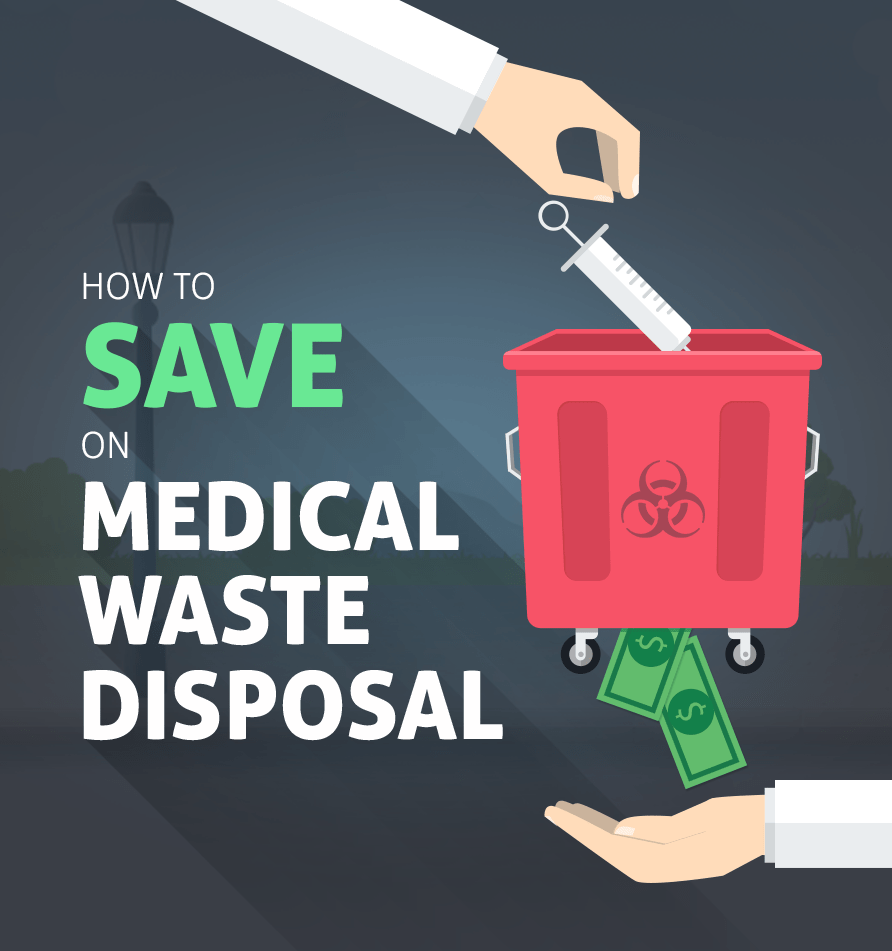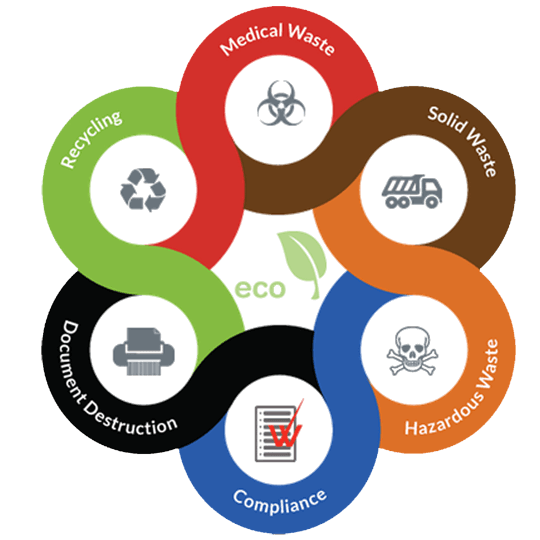Your Ally in Medical Waste Removal: Professional Service with Environmental Treatment
Wiki Article
The Significance of Effectively Managing Clinical Waste
Proper monitoring of medical waste is of utmost significance in health care centers. The handling, storage, and disposal of medical waste call for stringent adherence to standards and guidelines to make sure the safety of clients, healthcare workers, and the setting. Improper management of medical waste can present significant health and wellness risks, consisting of the transmission of contagious illness and injuries from sharp objects. Improperly disposed of clinical waste can have damaging impacts on the environment, infecting water resources and soil. Medical care facilities have regulative and lawful obligations to correctly take care of medical waste, and failing to abide can lead to fines and legal effects. By implementing ideal methods for secure handling and disposal of medical waste, medical care professionals can minimize these risks and add to a more secure and healthier setting for all. Adequate education and learning and training on waste monitoring are critical for healthcare professionals to meet their obligations in this field.Wellness Risks Connected With Improper Waste Administration
Inappropriate management of medical waste positions significant health dangers to both medical care workers and the general public - WasteX Medical Waste Disposal. Clinical waste, which consists of sharps, infectious materials, drugs, and radioactive compounds, calls for correct handling and disposal to prevent the spread of infections, injuries, and exposure to hazardous compounds
Among the main health risks associated with inappropriate medical waste management is the transmission of infectious illness. Health care workers that come into call with infected waste may contract conditions such as HIV, hepatitis, or various other bloodborne pathogens. In a similar way, if medical waste is not correctly thrown away, it can pollute the setting, water sources, and even food, leading to the spread of illness within the area.
Incorrect waste monitoring can likewise bring about injuries, especially from sharps such as needles, scalpels, and damaged glass. Unintentional needle pricks can lead to the transmission of bloodborne illness, while cuts from sharp objects can trigger severe injuries and infections.
Furthermore, the improper disposal of pharmaceutical waste can lead to the contamination of water supplies. When ended or unused medications are purged down the toilet or disposed of wrongly, the chemicals can seep into water resources, influencing aquatic life and potentially getting in the human food chain.
Environmental Influence of Improperly Disposed Medical Waste
One of the significant consequences of poor administration of medical waste is its damaging effect on the environment. Incorrectly disposed clinical waste poses a significant risk to communities, water bodies, and the total balance of the atmosphere. WasteX Medical Waste Disposal. The dangerous products contained in clinical waste, such as contagious agents, drugs, and chemicals, can infect water, air, and soil, causing prevalent air pollution and degradationWhen medical waste is not appropriately set apart, dealt with, and disposed of, it can locate its way into water bodies through incorrect garbage dump techniques or illegal discarding. This can lead to the contamination of groundwater and surface water, influencing water life and possibly contaminating drinking water sources. The release of dangerous chemicals and drugs right into the atmosphere can interfere with ecosystems and injury both pet and plant types.
Additionally, incorrect incineration of medical waste can release poisonous toxins, including furans and dioxins, into the ambience. These pollutants have actually been linked to various health and wellness concerns, consisting of respiratory system issues, reproductive disorders, and also cancer cells. The release of greenhouse gases during incineration additionally adds to environment modification.
To reduce the ecological influence of poorly disposed medical waste, it is vital to carry out proper waste monitoring techniques. This consists of segregation of waste at the source, appropriate therapy approaches, and risk-free disposal strategies. By doing so, we can reduce the contamination and safeguard the environment from the damaging consequences of clinical waste mismanagement.
Regulative and lawful Responsibilities for Health Care Facilities
In order to address the environmental effect of improperly disposed clinical waste, medical care facilities are called for to follow regulatory and lawful responsibilities. These commitments are put in area to make sure the proper handling, storage, transport, and disposal of medical waste in a risk-free and eco liable fashion.One of the essential lawful commitments for medical care facilities is to acquire the essential licenses and licenses for managing medical waste. This consists of acquiring a waste generator identification number and following government, state, and local policies. Medical care facilities should also keep in-depth documents of the types and quantities of clinical waste created, as well as the approaches utilized for its disposal.
In addition, healthcare facilities need to implement appropriate partition and product packaging treatments for various types of medical waste, such as sharps, contagious waste, and pharmaceutical waste - medical waste removal service. This includes utilizing leak-proof containers, biohazard bags, and sharps containers that satisfy regulative criteria
Healthcare facilities are also in charge of making sure that their team obtain appropriate training on Click This Link the proper handling and disposal of clinical waste. This consists of training on infection control, personal protective tools, and waste monitoring methods.
Best Practices for Safe Handling and Disposal of Medical Waste
To make certain the secure handling and disposal of clinical waste, health care facilities must apply finest methods. These techniques are vital to secure the health and wellness and security of both healthcare workers and the general public. The correct monitoring of medical waste is crucial in avoiding the spread of infectious conditions and decreasing ecological contamination.Among the finest methods for safe handling and disposal of clinical waste is segregation. Medical care centers need to separate different kinds of clinical waste, such as sharps, transmittable materials, and pharmaceutical waste, to avoid cross-contamination. Proper labeling and color coding of waste containers additionally play an essential duty in making certain the correct segregation of clinical waste.
Another vital best technique is the usage of appropriate containers for saving and delivering clinical waste. These containers must be watertight, puncture-resistant, and appropriately sealed to avoid any type of feasible release of harmful products. Furthermore, medical care facilities must establish clear methods for the collection, storage space, and transport of medical waste to decrease the danger of direct exposure and contamination.
In addition, health care centers should educate their staff on the appropriate handling and disposal of clinical waste. Regular training sessions and refresher courses should be conducted to maintain health care workers updated on the current laws and guidelines. This will certainly aid ensure that everybody involved in the procedure understands the prospective risks and is equipped with the essential understanding and skills to take care of clinical waste securely.
Education and Training for Health Care Professionals in Waste Administration
Health care experts call for extensive education and training in waste administration to make sure the proper handling and disposal of medical waste. The administration of medical waste is a critical component of health care procedures as it straight affects the health and wellness and safety of both health care workers and the public. Proper education and learning and training furnish medical care specialists with the needed understanding and abilities to handle and get rid of of clinical waste in a risk-free and ecologically accountable manner.Education and training programs for medical care specialists in waste administration cover a variety of topics, consisting of the category and segregation of medical waste, correct product packaging and transport, labeling and storage demands, and making use of individual safety devices. These programs likewise highlight the significance of adherence to neighborhood, national, and worldwide laws and standards regulating medical waste monitoring.
By getting extensive education and training in waste monitoring, health care professionals can effectively reduce the risks related to clinical waste, such as the transmission of infectious conditions and the potential injury to the atmosphere. WasteX Medical Waste Disposal. Moreover, well-trained specialists can identify and execute ideal methods that promote sustainability and effective waste monitoring practices within health care centers.
Constant education and learning and training in waste management ought to be a continuous priority for healthcare experts, as waste administration methods and guidelines may develop with time. By staying updated with the most recent advancements in waste administration, health care specialists can guarantee that they are geared up with the understanding and skills needed to make educated choices and add to the general enhancement of waste management techniques in medical care settings.

Verdict
In verdict, appropriate management of clinical waste is essential to alleviate wellness threats and reduce the ecological impact. Health care centers have governing and legal commitments to make sure risk-free handling and disposal of medical waste.
Health care experts require detailed education and learning and training in waste management to guarantee the correct handling and disposal of medical waste - medical waste disposal. The monitoring of medical waste is a crucial element of medical care procedures as it straight influences the health and security of both health care employees and the general public
Report this wiki page